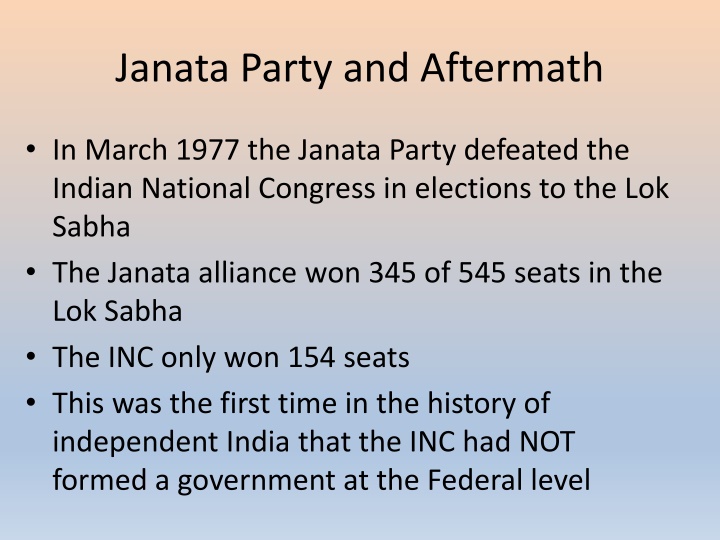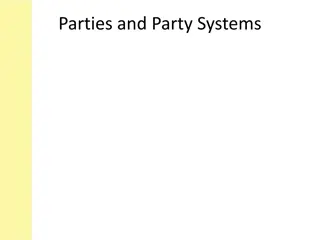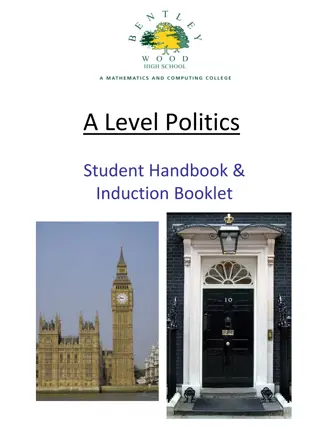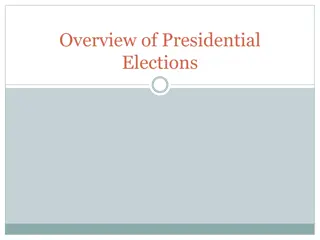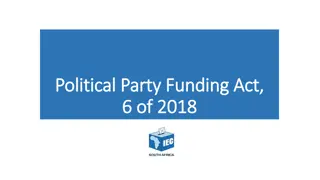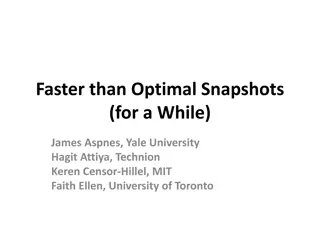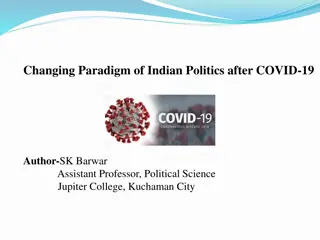The Janata Party Era in Indian Politics: A Snapshot of Change and Challenges
The Janata Party's rise and fall in Indian politics from 1977 to 1980 marked a significant shift as it defeated the long-standing Indian National Congress. The alliance faced internal struggles, including leadership disputes and corruption charges that led to its downfall. Despite its short duration, the Janata Party era highlighted emerging trends and the empowerment of middle peasants and backward caste populations in Indian politics.
Download Presentation

Please find below an Image/Link to download the presentation.
The content on the website is provided AS IS for your information and personal use only. It may not be sold, licensed, or shared on other websites without obtaining consent from the author.If you encounter any issues during the download, it is possible that the publisher has removed the file from their server.
You are allowed to download the files provided on this website for personal or commercial use, subject to the condition that they are used lawfully. All files are the property of their respective owners.
The content on the website is provided AS IS for your information and personal use only. It may not be sold, licensed, or shared on other websites without obtaining consent from the author.
E N D
Presentation Transcript
Janata Party and Aftermath In March 1977 the Janata Party defeated the Indian National Congress in elections to the Lok Sabha The Janata alliance won 345 of 545 seats in the Lok Sabha The INC only won 154 seats This was the first time in the history of independent India that the INC had NOT formed a government at the Federal level
JANATA PARTY Who were the JANATA PARTY? Members of the INC (O), INC (I) defectors like Jagjiwan Ram (Dalit leader) Socialists such as Limaye, Fernandes, Dandavate Rising representatives of MIDDLE PEASANT and BACKWARD CASTE population such as CHARAN SINGH Most significantly, the old JANA SANGH. All of these DISSOLVED their old parties, and joined a NEW organization called the JANATA or Peoples Party Main objective, oppose Indira Gandhi and in March 1977, they defeated her
Janata Problems Short lived. The Janata interregnum lasted only from March 1977 to Jan 1980. Mrs G was back in power in 1980 First, bickering over who would be PM. Finally Morarji DESAI gets to be PM. RAM (Dalit) and CHARAN Singh (Middle Peasant) and Jana Sangh (RSS) leader VAJAPAYEE and ADVANI get plum cabinet posts NO IDEOLOGICAL unity. Anti Indira, and that did not keep them together for long CORRUPTION. Not too unlike the INC, quick to dip snouts in the trough. While charges of corruption had not prevented INC politicians from being elected, Janata had promised a new start, people did not expect corruption from them so quickly!
Significance of Janata Era The era crystallized some important emerging TRENDS in contemporary India which only now were allowed a POLITICAL expression. The overwhelming presence of the INC since independence MASKED significant social and economic changes in the. Ironically, the divided, bickering, non-cohesive Janata Party allowed expression to these changed realities. Janata Party did not last, but these new trends remain a significant aspect of Indian politics
Middle Peasants British agrarian policies on the 20thC gave lower caste CULTIVATORS of land a lot more rights than traditionally had. ABOLITION of ZAMINDARI benefited similar CULTIVATING groups. Many of these groups had been the backbone of Nehru s lieutenants such as Kamaraj. They then came to support parties such as DMK in Tamilnadu, were the backbone of the CPM in Bengal. Where the GREEN REVOLUTION was successful, the folks who really benefited most were the middle peasants/ cultivators Indira s populism work to their benefit. Erase debts of electricity e.g. Middle peasants gaining clout in states for a while, now wanted a say at the Federal or CENTRAL government level. Got it with CHARAN SINGH and the support of Socialists in Janata.
Other Backward Castes (OBC) Now these groups coalesce around the label of OBC No classical text had this notion of BACKWARD or FORWARD Castes A product of modern politics: folk who felt themselves to be dispossessed. Commission of Enquiry (Mandal Commission) set up by JANATA Government pointed out the relative disadvantage in terms of jobs, education, etc. of OBCs In the Forward category were the Brahmins, the Rajputs (aka Kshatriya) Kayastha and Bania (Vaisya) who had historically monopolized literacy, scholarship, commerce, and political power (Guha, 530) to which must be added, historically, control over LAND. But, Dalit (formerly, untouchable) and OBC together formed well over 60% of the population. They were the real CULTIVATORS, leased land or small owners. In turn OBC employed other, LOWEST caste, often DALIT LABORERS in the farms they cultivated
Dalit-OBC conflicts A Dalit-OBC combination was the demographic majority, but there were contradictions between the two groups. OBC middle peasants employed Dalit labor, and wanted to give them the lowest possible wages Dalits, meanwhile, had been organizing politically since Ambedkar s time, but were economically badly off Dalits though, did have constitutionally-mandated reservations for jobs and schools OBC landlords resented Dalit uppityness and often came down brutally on any sign of Dalits acting in ways beyond their assigned station in life A massacre of Dalits in Bihar during the Janata era actually allowed Indira Gandhi a way back into mainstream politics. She made a politically successful visit to console the victims, and reached out to Dalits as their savior from the OBCs.
Rise of Hindu Nationalism The Janata era was the first time Hindu Nationalists were a component of the National Government Important Ministries: Foreign Affairs, Information and Broadcasting, and most significantly, Education, run by Hindu Nationalists Able to recruit fellow Hindu nationalists as teachers, shaping ideology of future generation Status of Hindu Nationalists as beyond the pale changed New Party, BJP, said their ideology was Gandhian Socialism
Ineptitude of Janata: Paving the way for Indira s Return Ineptitude of the Janata government helped Indira Gandhi no end. They botched her first arrest and she was out of jail in no time. After she won reelection to Parliament from southern India, they jailed her again for violating Parliamentary Privilege in her earlier terms in office. The courts released her after 7 days in jail. She was stripped of Parliamentary seat, but was re-elected in a matter of weeks
Other Long Term Impacts of Janata Era DECENTRALIZATION of Indian politics Greater autonomy of States (especially as compared to Indira Gandhi s era) Emergency spawned many new social movements, civil society, civil liberties, feminists, etc. Censorship led to revival of interest in Journalism!! Many of these appear to be rolled back in the last 8 years
